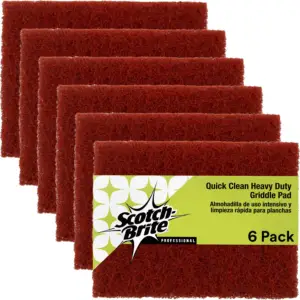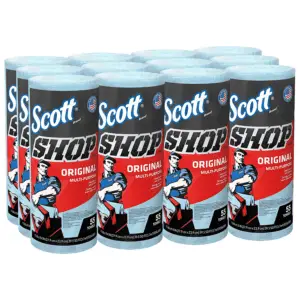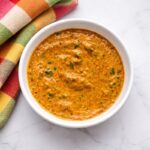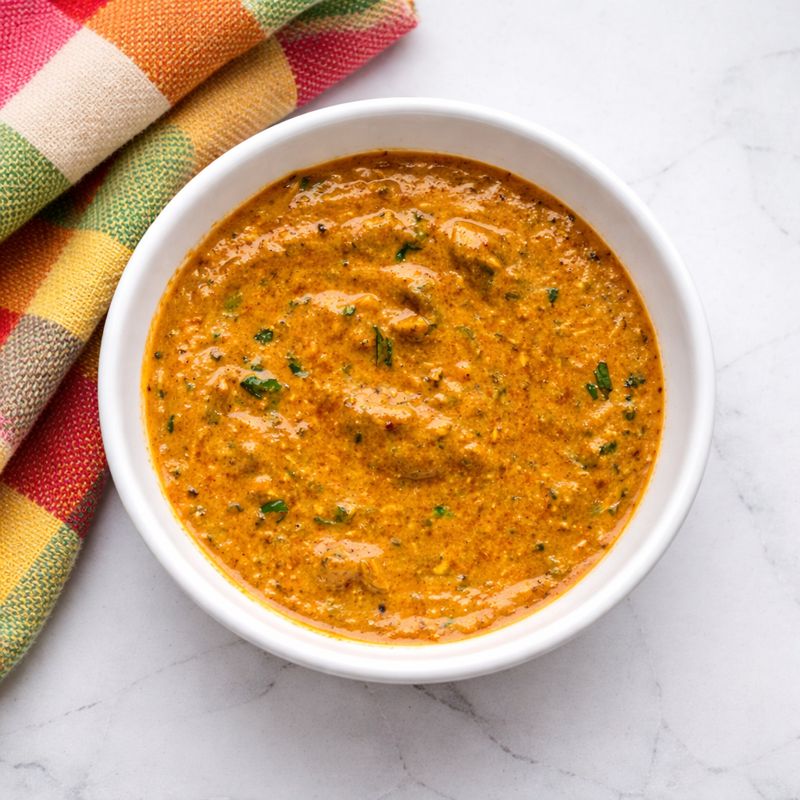Share via:
Ever looked at your Blackstone Griddle and wondered why it just keeps rusting, regardless of how often you have been cleaning it?
Or maybe you’ve been noticing an increased amount of rust building up on your griddle that’s been left idle? This can indeed be frustrating.

Well, in simple terms, rusting is a natural process that occurs when iron, oxygen, and water (or moisture) come into play.
Blackstone griddles are built to resist wear and tear to survive the longest. If you live in an area where it is normally humid, is next to the sea, or if you don’t clean your griddle on a regular basis, rust may be a problem for Blackstone griddles. As they often corrode and turn a reddish-brown color.
Are you wondering “Why is my Blackstone rusting? How can I prevent it and clean it when it happens?”
Blackstone griddles are prone to rust due to exposure to moisture and lack of proper maintenance. The combination of humidity and neglect can lead to rust formation on your griddle’s surface. To prevent this, ensure you clean and reseason your Blackstone after every use, keep it covered when not in use, and store it in a dry place. Taking these steps will help protect your griddle from rust and keep it in pristine condition for years to come.
We are going to delve into the top reasons why your Blackstone Griddle may be rusting and how you can avoid it. We’ll also equip you with some easy-to-follow steps, to rescue your griddle when rust decides to show up.
Related > > 10 Blackstone Griddle Tips & Tricks (Hacks)
Related > > Everything You Need to Know About Blackstone Griddle: A Complete Guide
Table of Contents
Why And How Does Rust Form On Blackstone Griddle
A griddle made of iron is the most likely to rust. Rust is the red oxide formed when iron reacts with water or oxygen. Rust is a common, often irreversible, metal corrosion.
Rust, a reddish-brown compound known as iron oxide, forms when iron reacts with oxygen and moisture in the presence of an electrolyte like saltwater.
Griddles, such as those made by Blackstone, are primarily constructed from steel, which is an alloy composed mainly of iron and carbon.
Steel’s composition makes it susceptible to rust as it readily undergoes oxidation and corrosion when exposed to moisture and oxygen.
Therefore, when Blackstone griddles are left exposed to environmental factors, such as humidity, rain, and salt-laden air (common in coastal areas), the steel surfaces become prone to rust formation.
It’s essential to acknowledge the inherent rust susceptibility of steel and take measures to safeguard and maintain griddles to ensure their longevity and optimal performance.
If the Griddle has come to the end of its life, you will start to notice rust accumulating. Note that this is rust, which is mostly the result of your griddle getting very old.
You can also check How to Stop Grill Grates From Rusting? 9 Quick Tips
7 Reasons Why Is My Blackstone Rusting
Rust formation on griddles is a common issue and can be attributed to several factors:
1. Moisture
The primary catalyst for rust formation is moisture. Even a small amount of water on the griddle’s surface, whether from rain, humidity, or dew, can trigger the corrosion process.
Griddles are particularly susceptible to moisture-related rust due to their exposure to the elements. Moisture is quite literally the lifeblood of rust. When water comes into contact with your griddle, it reacts with the iron, kick-starting a process called oxidation — this is what we see as rust.
Moisture may come from a variety of sources, including washing your griddle, rain, or even the steam from cooking.
2. Air
The air we breathe contains oxygen, and as mentioned earlier, oxygen is a key component in the rusting process. So, as long as your griddle is exposed to the open air, it’s susceptible to rust formation.
3. Temperature Fluctuations
Temperature fluctuations can play a significant role in causing rust on a Blackstone griddle. Here’s how it happens:
- Condensation: When a warm griddle is exposed to a sudden drop in temperature, such as when evening sets in or when it rains after grilling, the metal cools down. This cooling can cause moisture in the air to condense on the griddle’s surface. Condensation provides the perfect environment for rust to develop as it introduces water to the metal.
- Thermal Expansion and Contraction: Metals expand when heated and contract when cooled. Repeated expansion and contraction due to temperature fluctuations can create small cracks or imperfections in the seasoning layer of the griddle. These cracks become vulnerable points for moisture to penetrate, leading to rust formation.
- Differential Rates: Different materials, like the metal of the griddle and its surrounding environment, can have varying rates of temperature change. This can create stress on the griddle’s surface, potentially compromising its protective layer and making it more susceptible to rust.
4. Salt Exposure:
For those living in coastal areas, or for anyone using their griddles near the sea, salt in the air can be a significant factor in rust formation.
The salt in the air, especially in the form of saltwater mist, can promote rust on metal surfaces more quickly than in non-coastal environments.
5. Use Of Acidic Food On Griddle
The acidity in certain foods, like tomatoes and citrus fruits, can contribute to rust formation on Blackstone griddles. Here’s how:
- Acidic Foods: Tomatoes, lemons, vinegar, and other acidic ingredients are common components of various recipes. When these foods come into contact with the griddle’s surface, their acidity reacts with the iron, causing a chemical reaction that leads to corrosion.
- Iron Oxidation: The acidic nature of these foods accelerates the oxidation of iron present on the griddle’s surface. This oxidation process forms iron oxide, commonly known as rust, which can compromise the griddle’s integrity.
6. Keeping your grill in the kitchen
keeping your grill in the kitchen can expose it to moisture, steam, and other factors that may lead to rust formation. Here’s why:
Steam and Moisture: Cooking in the kitchen generates steam and moisture, which can be released into the air. This humidity can settle on the grill’s surface and, over time, contribute to rust.
7. Improper Cleaning
Ever wonder why a rusting Blackstone griddle keeps seeming to rust no matter what you do? Well, the answer might be as simple as your cleaning routine.
That’s right! How often and how thoroughly you clean your griddle can play a major role in rust prevention.
Cleaning after every use:
A greasy griddle screams ‘welcome’ to rust. By just wiping away excess oil and food debris after each use, you can drastically reduce the chances of rust forming.
The less time oil and food particles have to break down and react with the griddle’s surface, the less likely you’ll encounter your unwanted rusty visitor.
Gather Supplies to Clean Rust Off Blackstone Griddle
To start, gather everything you need to get the rust off of the Blackstone griddle.
–A metal scraper or Blackstone cleaning brick
-Cooking oil
-Paper towels
-Grill stones or sandpaper or steel wool
-Paper Towels or griddle clothing rags
The oil you are using must be cooking oil. Sesame oil, palm oil, olive oil, etc. are examples of cooking oils that can be used. Regarding rags, clothing rags are often considered the best choice. Paper towels work as well.
Make sure gloves are heatproof because resistance to heat is needed when using them on a heated griddle.
You can also get this griddle cleaning kit. Here is a list of must-have 12 Best Griddle Accessories
How to Get Rust Off Blackstone?
Cooking your meal on a rusty griddle is risky and one thing is for sure: it certainly isn’t appealing! Nobody likes a rusty kitchen appliance, as it can be unsightly.
The rust on the griddle surface can cause the food to stick and ruin the flavor of the dish. Follow the below steps on how to clean a Blackstone griddle that has rust.
Step 1: Safety Precautions
Begin the rust removal process by ensuring your griddle is cool to the touch to avoid any burns or injuries.
Step 2: Prepare the Griddle
Put on a pair of sturdy heat-resistant gloves for protection. Turn on the griddle to high heat and let it sit for 20 minutes. This softens the rust for easier removal. You can then turn off the griddle & allow it to cool. The rust will not instantly harden, but It’s best to clean the rust while it’s still soft.
Step 3: Removing the Rust
To remove rust from your griddle surface, you will need to use a metal scraper. While the rust is still soft and has not dried out, scrape the flat top surface of the griddle with a metal scraper.
The rust will start to come off easily. Repeat this process until you are sure that your metal griddle feels smooth when rubbed with a scraper and you can’t see any more corrosion.
Step 4: Cleaning with a Grill Stone
For a deeper clean, utilize a grill stone. Ensure the grill stone is rough on one side and lightweight with a handle for ease of use.
No soap is necessary. Drizzle 3-4 tablespoons of cooking oil over the griddle’s surface and scrub with the grill stone in slow, gentle circular motions.
Alternatively, steel wool or medium grit wet-or-dry sandpaper can be used. Wipe the griddle with a cloth, paper towels, or griddle rags. Repeat the oil scrubbing process until no rust remains.
You can also use the pumice stone to sand the griddle surface.

After thoroughly cleaning the residue off, add another 3-4 tablespoons of oil and scrub with a cloth until the oil starts coming off like it is clean. Continue cleaning off rust from the griddle with oil until there are no traces of rust left behind.
Scrubbing a griddle surface with an abrasive scrubber after every use will only damage your griddle plate. So only use these scrubbers and stones when you need to remove rust. To clean griddle, use water and a Scouring Pad instead.

Step 5: Season the Blackstone griddle
As a final step, season the griddle once it is clean and rust-free. To prevent future rust, it’s crucial to season the griddle.
This process creates a protective, non-stick coating that enhances flavor and durability.
The seasoning process creates a protective coating on top of the griddle, which acts as a non-stick surface. This ensures that your food will taste the way it was meant to be tasted.
If done correctly, this coating prevents food from sticking to the surface and makes clean-up much easier.
A seasoned griddle is easy to clean and does not corrode, which means it lasts longer and has better durability.
How To Season Your Blackstone Griddle
To season your griddle, you will need:
- Heat resistant gloves
- Vegetable cooking oil
- Griddle seasoning or cast iron conditioner
- 2 Squeeze bottles
- Paper towel or griddle rags
- Tongs
- Water
Once you have removed the rust from the griddle, it’s time to reseason it with the same process used for seasoning a new griddle.
1. To season your griddle, preheat it for 10-15 minutes until the surface becomes super dark and looks almost burnt.
A squeeze bottle is ideal for helping you manage both water and oil.
Wipe the griddle’s surface with a damp paper towel to remove any loose dust or dirt.
2. Now turn off the griddle and apply a thin layer of cooking oil to the griddle surface. You can use any type of cooking oil you want.
If you have a higher quality one, like flax or olive oil, that’s great! These types of oils will bind better to the metal surface.
3. Now turn the heat up again and let it smoke. That’s all you need to do. Let the oil burn in high heat to create a bond between the metal and the oil.
4. After about 30 minutes, the amount of smoke in the air will be minimal and you know it is time to turn off the griddle.
High heat will break down the oil and the fatty acids bind together to form a new layer of molecules.
This layer helps protect the griddle surface from the outside environment and acts as a barrier to moisture. Hence helps to prevent the Blackstone griddle from rusting.
Make sure to season the griddle sides too. It’s important for easier cleaning and preventing rust.
As you cook more on your seasoned griddle with oil, the better it will get. Not only does it enhance the flavor of food, but it also provides a good cooking experience.
Step 6: Apply an Additional Layer of Oil
Drizzle another 3-4 tablespoons of cooking oil onto the griddle’s surface to create a robust protective layer against rust formation.
A thicker layer makes it more challenging for moisture to reach the iron surface.
Consider using Cast Iron Conditioner to season the Blackstone griddle, as recommended by Blackstone.
If you ever encountered mold on the grill check this How To Clean Mold Off My Grill – Best Way
Cleaning Blackstone Griddle With vinegar And Baking Soda
To remove rust stains and to minimize scrubbing time, vinegar, and baking soda paste can also help. Entirely mix 2 parts baking soda to 1 part vinegar into a thick paste, then pour it on a still-hot griddle surface as quickly as possible.
The baking soda and vinegar work together to loosen and lift stubborn grease and rust stains from the griddle.
Scrape the griddle surface with your griddle brick/pumice stone, making small concentric circles until the surface is clean.
Now clean it with a cleaning cloth and you can easily reseason the griddle by rubbing it with a rag soaked in cooking oil.
How to Clean Blackstone Griddle After Cooking
The best way to clean a griddle is to do it after each cooking, which will keep the surface of the griddle clean and prevent any build-up.
Doing this also means that you’ll never have to scrub off caked-on food from the griddle’s surface, which can be a very time-consuming process. Here is a step-by-step process to Clean Blackstone Griddle After Cooking (5- Steps)
Deep Cleaning Blackstone Grill
When oil seasoning on the griddle plate changes color, flakes off in more used areas, or gets coated with grease or burnt food it’s time to deep clean the griddle
Deep cleaning a griddle is a labor-intensive and difficult process. The most time-consuming part of cleaning the griddle is removing the griddle seasoning from the top surface.
If you need to deep clean your griddle, there are some eco-friendly ways to do it: lemon juice and vinegar.
Lemon juice and vinegar have powerful acids that can break down stubborn fats and oils, making them a much more eco-friendly solution than using chemicals.
What you’ll need:
- Vinegar or lemon juice
- A griddle Scraper
- Water
- Cooking oil in a squeeze bottle
- Grill Stone or pumice stone
- Paper towels
Steps to Deep Cleaning Blackstone Griddle
- Heat the griddle on the high setting.
2. Mix lemon juice or vinegar solution in water and pour it on the griddle plate.
- Start swirling the mixture around on the griddle’s surface for about 5 minutes. Use a spatula to scrape down the surface and break up any leftover crusty bits of seasoning.
- Soak it for 20-30 minutes.
- After soaking, now turn off the griddle and wait for everything to evaporate away.
- The griddle seasoning has softened. You should be able to scrape it off into thin strips with a scraper now.
- The soaking and scraping steps need to be repeated until the grill plate is smooth and metal starts to appear.
- After most of the seasoning is gone, rub oil onto the griddle using a grill stone to make it smooth & remove any loose bits.
- Now clean the grill plate with paper towels or griddle rags until they come off clean.
- After the protective seasoning layer has been removed, you can begin to reseason your grill.

How to Prevent Rust On Blackstone Griddle
Below are a few tips to stop griddles from rusting.
- Season the griddle before each use and it can prevent Blackstone griddle from rusting. A protective layer of seasoning is all it takes to protect your griddle from the elements. Apply a thin layer of oil after cooking each time on the griddle. Keep it simple by adding 3-4 tablespoons of oil and wiping it with a paper towel.
- You should store your griddle in a dry place. If you live in an area with a lot of moisture, consider keeping your griddle somewhere that’s well-ventilated. Keep it away from bathrooms.
- Getting a heavy-duty canvas cover for the griddle -, will keep it safe from any humidity and give you peace of mind knowing that it will be protected from wear and tear.
- After cooking, make sure to store your griddle in a nice and safe place, until you will use it again. Don’t pile anything on the plate or keep any pointy metal objects nearby – this might cause scratches.
- If you haven’t used your griddle for a week+ it’s a good idea to have a quick inspection at the beginning of the following month. When rust is at its beginnings, it’s easier to remove. On the contrary, when it has already gone too far into the metal, you will need to take special care.

For all griddle owners having rusty griddles, this article “How to keep Blackstone from rusting” will help you eliminate that pesky rust for good.
How To Take Care Of A Blackstone Griddle?
A griddle is a heavy-duty cooking surface. It is made of cast iron and can be used for a variety of purposes, such as searing, pan frying, deep frying, and griddling. A griddle is an investment in quality cooking.
Maintaining it properly will ensure that the food you are cooking on it is cooked well.
It’s not hard to take care of and maintain the Blackstone griddle. To maintain a griddle, you usually don’t need to scrub or even wash it. All you’ll want to do is season, and that’s about it –
Seasoning a griddle will make the surface nonstick and your food won’t get stuck to it. The secret is to make sure that you oil it for seasoning and store it properly.
So that it will last for a long time.
The Griddle will last for generations with proper care. The idea of your sweet grandson or even HIS grandson griddling it up on a Blackstone is amazing.
Final Words: Why Does My Blackstone Keep Rusting
A griddle is an incredibly versatile kitchen appliance. To prevent Blackstone griddle rust problems, it should be taken care of regularly.
Different vehicles & vessels are usually made of iron, just like the Blackstone griddles are.
They are given a coat of paint to help them resist rusting. But you can’t actually paint the griddles since they’re meant for cooking food. The chemicals in the paint could mix with the food and pose a danger to human lives.
That’s why you need to know how to clean Blackstone rust. Also, prevent the griddle from rusting by following the tips above.
Comment below to let us know how our tips helped you in protecting your griddle from rusting.
FAQ’s
How Can I Clean a New Griddle Before Using it for the First Time?
There are different ways that you can do this, but one of the most effective ways is using soap and water.
Fill up a bucket with warm water. Add soap and keep stirring the mixture to form a soapy lather until it reaches the desired pourable consistency.
To remove any kind of residue from shipping and storage, scrub the surface with a clean towel that has been soaked in soapy water. Now dry the griddle with new dry towel or paper towel.
Allow the griddle to dry thoroughly before use or storage. This eliminates the risk of rust.
How long does it take for vinegar to take off rust from griddle?
Check the griddle surface periodically to see if the rust has softened. Once the rust has softened, you can scrub it off with a scouring pad or scraper.
Why does my blackstone look rusty?
References:
My Griddle got rusted, is there a fix?
Related Articles
Why is Blackstone Griddle Not Getting Hot? (6 Reasons)
How Hot Does A Blackstone Griddle Get?
Quick Fixes For Your Blackstone Griddle Flaking
Why Is My New Blackstone Griddle Sticky Out Of Box?
Mold on Blackstone Griddle (6 STEPS TO CLEAN MOLDY)

Hi, I’m Sabah — the cook behind grillcuisines! I share easy, family-friendly recipes made with love and simple ingredients.









